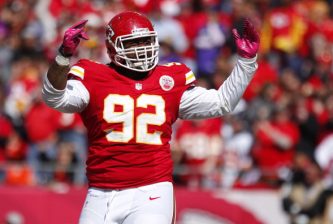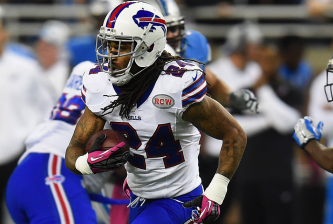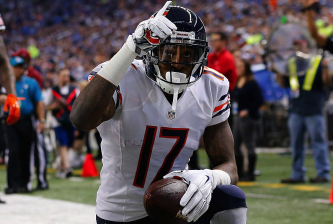As NFL training camps open this weekend, the annual period where players face the wrath of the league’s substance abuse policy will be well underway. Players who dare to smoke marijuana facing the harsh reality of being shut down for as much as four games to an entire season due to the NFL’s substance abuse rules.
In late July alone, Le’Veon Bell, Rolando McClain and Randy Gregory were all harshly punished by the NFL. Currently suspended Oakland Raiders linebacker Aldon Smith also drew headlines for an alleged Periscope video that featured a person believed to be Smith smoking a blunt and will reportedly be investigated by the NFL for another substance abuse violation.
The suspensions and scandals naturally brought out the moral outrage police over NFL players using recreational drugs in their free time. Most notably Stephen A. Smith going on another “Stay Off The Weeeeeeeed-Uh” rant on First Take and the usual takes about athletes being stupid for risking millions of dollars to smoke weed.
But the one discussion that should be more prominent every time a star player in suspended over the substance abuse policy is that the policy needs a complete overhaul as athletes shouldn’t have their living taken away from them due to substance abuse or marijuana use.
In 2016 alone, 21 players have been suspended under the substance abuse policy a number that is staggeringly high and begs the question if the league’s policy could be improved to move under a model that is more similar to the National Hockey League. Where players who are arrested for drug use are placed into a substance abuse program to receive treatment, but can still play and earn their living.
To have 21 players suspended in seven months is bad for the NFL and especially bad when it comes to the suspensions for marijuana. A drug that is less harmful than the painkillers the NFL allows players to use to play injured and is currently becoming legal in certain states where NFL teams reside.
Further is the NFL’s rule in which teams can not contact their suspended players under the substance abuse policy. A rule that has come to light with Aldon Smith’s suspension as the Raiders are not allowed to contact Smith and serve as a support group for their player as he enters rehab. A policy that serves more to punish players and teams than it serves to take a stance against substance abuse.
There is no reason why the Raiders, a team that has publicly noted they are in Smith’s corner as he deals with his problems, shouldn’t be able to reach out to a player who is entering rehab to offer their support. That rule, of all the problems the NFL substance abuse policy has, is one of the most shameful rules the NFL currently has. To take players away from their support system is a disgrace that the NFL manages to get away with due to the negative perception much of the fans have towards players who are suspended under the substance abuse policy.
The NFL’s substance abuse policy has many problems and they stem from taking a punishment stance rather than serving the players who do struggle with addiction. The current substance abuse policy feels more like a witch hunt of the players than a policy that is in place to protect both the league and the players. Come the next CBA, both the NFL as well as the NFLPA should feel obligated to address the problems with the current policy to end an era that has been troubled with heavy suspensions to players who use recreational drugs with a weak support system being offered to players who actually have problems with addiction. Until that happens, the NFL deserves to be criticized for a policy that is only in place to punish the players.




